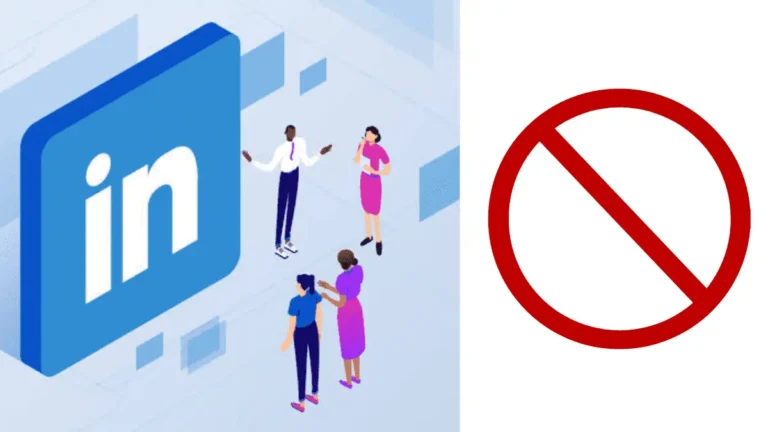Yes, there are scam jobs on Linkedin.

Credit: www.aarp.org
Identifying Signs Of Scam Jobs
Scam jobs on LinkedIn are a serious concern. It is essential to be able to identify the signs of these scams to protect yourself. One of the indicators of a scam job is a vague job description. When a job posting lacks specific details about the responsibilities and requirements, it raises suspicion. Another red flag is when a job offers a high salary with minimal requirements. If the offer seems too good to be true, it probably is. Genuine job postings usually provide company information and contact details. If these details are missing or hard to find, it may be a scam. Scammers often request personal information upfront, such as your social security number or bank details, which reputable employers would never do. Furthermore, unprofessional communication, including poor grammar and misspellings, is a common characteristic of scam jobs. Therefore, it is important to be vigilant and cautious when browsing job opportunities on LinkedIn to avoid falling victim to these scams.

Credit: www.wsj.com
Common Types Of Job Scams On Linkedin
There are various types of job scams on LinkedIn that you need to be aware of to protect yourself from falling victim. One common type of scam involves fake job postings. Scammers create enticing job offers that promise high salaries, great benefits, and flexible working hours to lure unsuspecting job seekers. They may request personal information or payment for a background check or training materials.
Another type of scam is the pyramid scheme. These scams involve promising job opportunities that require you to recruit others and earn commissions from their recruitment fees. Eventually, the pyramid collapses, leaving many people at the bottom empty-handed.
Phishing scams are also prevalent on LinkedIn. Scammers send messages or emails pretending to be recruiters or employers, asking for sensitive information such as passwords or financial details. Falling for these schemes can lead to identity theft and financial loss.
Lastly, be cautious of work-from-home scams. These scams often advertise easy ways to make money from home, requiring an upfront fee or investment. However, the promised job or business opportunity is usually non-existent.
It is important to be vigilant and verify the authenticity of job postings and individuals on LinkedIn. Protect your personal information and never provide payment or sensitive details without proper verification.
Preventing And Reporting Scam Jobs
Scam jobs on LinkedIn can be prevented and reported to protect job seekers. Stay cautious and report suspicious postings to maintain a safe professional network.
Researching the company and job posting is crucial before applying for any job on Linkedin. Verify the authenticity of the company by checking their website, online presence, and reviews. Look for any red flags like unprofessional websites or lack of contact information. Additionally, read the job posting carefully to see if it provides enough details about the company and the job role.
Trust your instincts: If something seems too good to be true or if you have any suspicions, it’s best to err on the side of caution. Scammers often use tactics to entice job seekers with high-paying jobs or work-from-home opportunities that sound too good to pass up.
Protect your personal information: Be aware of the information you share with potential employers. Never provide your Social Security number, bank account details, or any other sensitive information unless you are certain about the legitimacy of the job offer.
Reporting scam jobs to Linkedin: If you come across a suspicious job posting or suspect a scam, report it to Linkedin immediately. They have measures in place to investigate and remove fraudulent job listings.
Sharing your experience and warning others: If you have encountered a scam job on Linkedin, spread awareness by sharing your experience with your connections or in relevant Linkedin groups. By doing so, you can help others avoid falling victim to similar scams.

Credit: www.linkedin.com
Frequently Asked Questions On Are There Scam Jobs On Linkedin
Are There Scam Job Listings On Linkedin?
Yes, there are scam job listings on LinkedIn. Be cautious while applying and research the company thoroughly.
Is It Possible To Get Scammed On Linkedin?
Yes, it is possible to be scammed on LinkedIn. Be cautious and avoid sharing personal or sensitive information with unknown connections.
How Do You Know If A Company Is Legit On Linkedin?
To determine if a company is legitimate on LinkedIn, check for a complete and well-structured profile, genuine recommendations, a professional website, and engaging content. Look for active employees and connections, and avoid companies with suspicious or limited information.
How Do I Report A Scam Job Offer On Linkedin?
To report a scam job offer on LinkedIn, follow these steps: 1. Open the job posting and click on the three dots icon. 2. Select “Report this job” from the drop-down menu. 3. Choose the reason for your report and provide any additional details if necessary.
4. Click “Submit” to report the scam job offer to LinkedIn for investigation. Remember to report any suspicious activity promptly to protect yourself and others from potential scams.
Conclusion
While LinkedIn offers vast networking opportunities and legitimate job prospects, it is crucial to exercise caution when interacting with potential employers or responding to job offers. Scammers can take advantage of the platform’s popularity to deceive unsuspecting individuals. By staying vigilant, diligently researching, and engaging in due diligence, users can minimize the risk of falling victim to scam jobs on LinkedIn.
Remember, “if it sounds too good to be true, it probably is. ” Stay safe and protect your personal and professional reputation.





